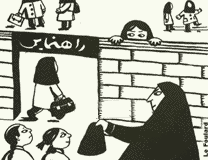
Barbie, Symbol of The Next Iran Revolution
by Shahla Azizi
 |
by Shahla Azizi |
|
 (PNS) TEHRAN --
It
is hard to be an Iranian or just a thinking, feeling,
human being, and not be angered and saddened by the state of affairs in
Iran. It is even harder to be a woman and a feminist.
(PNS) TEHRAN --
It
is hard to be an Iranian or just a thinking, feeling,
human being, and not be angered and saddened by the state of affairs in
Iran. It is even harder to be a woman and a feminist.
Women's struggle here, of course, is different from the West. As you strive to be considered a full witness in court and have the right to travel without your husband's permission, for instance, the influence of Barbie on the young female mind becomes a secondary issue. Here, Barbie is the symbol of a woman from a place that gives her equal rights and considers her a full human being -- even if she is anorexic. In this land that claims that one of the benefits of hejab (Islamic covering for women) is to lessen women's competitive and excessive preoccupation with appearances, the way a woman looks is everything. With more than 20 percent unemployment and lack of real opportunity for women, the only way to assure any kind of upward mobility is still a good marriage. Only now, a good marriage is considered to be one with someone who holds a Western passport, preferably from the United States -- an exit to a better life. Ironically, since there are very few venues or opportunities for men and women to date or even casually mingle, the way a woman looks becomes disproportionately important. It's hard to impress your character on someone, after all, when you only see them a few times before your formal engagement. Ever since the coming to power of president Khatami, the only visible reform here has been in the more lax and colorful hejab of women and the sounds of more music on the streets. Women can sing in a group, but not individually; the clergy claims it is provocative and too much for men to handle. Here, women are veiled and silenced in order that the men may not be provoked into sin. But such religious laws run counter to youthful hormones. Stroll down any uptown street in the evening and you'll see young men with the latest gelled haircuts and designer jeans cruising the streets in cars. Prostitution is rampant. The government even tried -- without success -- to legalize it in order to profit from it, most people say. Young women push the limits of the imposed hejab. The uniform Roopoosh, a coat that covers the body, is now shorter and tighter than ever. It comes in every color, from aubergine to bright pink. The head cover, meant to conceal all the hair (considered by the religious authorities to be a huge turn-on), comes halfway down the head in a state of perpetual suspension. Women use heavy makeup, with eyeliners that accentuate the eyes to the point of making them unavoidable, and lip-glosses that make everyone's lips like Brigitte Bardot's. Fifty percent of the population is under 25. The upper-class youth, the enfants dores of this town, spend most of their evenings going to private parties, drinking, doing drugs and dancing to the latest Western electronica music. Rave parties equipped with DJs of the moment are held in secret corners of the Caspian and the Alborz Mountains above Tehran. From time to time, these parties are raided. Many claim to have been whipped, beaten up, humiliated and mentally abused by the Special Forces (Bassijis), whose job it is to stop this un-Islamic behavior. But most go back to their partying, sometimes within days of coming out of prison. They boast about these experiences with the youthful zeal of someone having returned from an Outward Bound trip. These youths are no revolutionaries. They desire freedom, but lack ideology. Having had religion shoved down their throats, they have become nihilists. Often I hear, when people speak about American foreign policy, an outright desire to be attacked by the West. "God willing, they will bomb us too and end our misery," is a common refrain. You don't see an ideological battle any more here, but one of tastes and sexual mores. The next revolution is going to be about freedom of expression. Here, youths fight to be able to listen to Madonna and show a bit of flesh -- not to free the oppressed or curb economic injustice. These kids just want capitalism and rock 'n' roll. Of course they also want the ability to enter the universities, which are over-crowded, and the economic sphere, burdened with heavy unemployment. But the real driving force behind their behavior and restlessness is the need for individual expression. After decades of trying to shed the yoke of American imperialism with chants of "death to America," the majority of the urban population of this nation now believes that only America and American culture -- Barbie and all -- can bring about the freedom they so desperately seek.
Albion Monitor
November 26 2002 (http://albionmonitor.net) All Rights Reserved. Contact rights@monitor.net for permission to use in any format. |